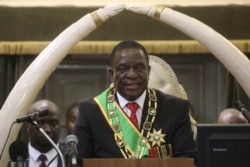Press freedom watchdogs say Zimbabwe’s government continues to stifle the media, despite promises by President Emmerson Mnangagwa to relax restrictions.
Kudzanai Musengi was arrested recently as he tried to record police enforcing the lockdown rules imposed by the government to contain the coronavirus.
Police said Musengi was filming them without a valid accreditation card. The government media commission has said the 2019 cards, however, of which Musengi was in possession, are valid until the 2020 cards are issued.
The freelance journalist says his arrest is an example of how authorities prevent journalists from doing their work.
“State security arms of government seem to operate in the world of their own," he told VOA. "Many a time, they harass, they arrest journalists, which is very worrying. We have seen an upsurge of these arrests especially during the lockdown.”
Human rights groups have recorded at least 15 arrests of journalists since Zimbabwe’s lockdown began in late March. In most cases, police said the journalists were intruding in their operations.
Nick Mangwana, the secretary of Zimbabwe’s ministry of information, told VOA that some of the arrests during the lockdown are a result of a “misunderstanding.” He says the government regards the media as part of the “essential services.” He added that Mnangagwa’s government is ensuring that the journalists’ legal environment improves.
“If you check in the last two years, Zimbabwe is the only country that improved in accordance of Freedom House index," he noted. "We have clearly been a different government, especially in the new dispensation to the previous one, in our approach to freedom of information, and as well to the freedom of the media.”
For years, human rights groups and advocates for free media have classified Zimbabwe as being harsh toward journalists. The government of longtime president Robert Mugabe was notorious for arresting journalists and shutting down news outlets who published work deemed critical of Mugabe, his allies or his wife, Grace.
When Mnangagwa took power in November 2017, he promised to change that.
But Tabani Moyo, the head of Media Institute of Southern Africa in Zimbabwe, says proposed new media laws are equally bad as the previous ones.
Most of the reforms were thrown out when the bill went before Parliament, which is ruled by Mnangagwa’s ZANU-PF party.
“This doesn’t show a government which is breaking with the past, but which is intolerant to divergent views, whereby the press is seen as part to contest to power and is treated as such," Moyo said.
Moyo said the arrests of the 15 journalists confirmed their fears that Zimbabwe’s government is not in favor of press freedom.





